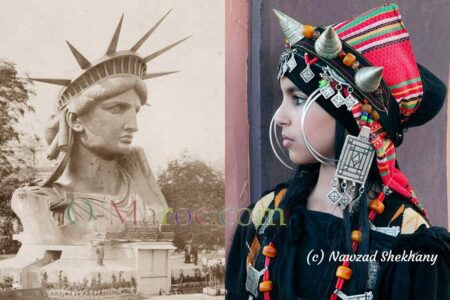It was twelve years after Bartholdi's supposed journey to southern Morocco that Charles de Foucauld travelled there, being one of the very first Westerners to discover this country of dissidents.
Ch. de Foucauld discovers the desert and Islam in Morocco
Charles de Foucauld is part of Catholic legend as much as colonial legend.
This cavalryman, from a noble family with a military tradition, passed through Saint-Cyr and then Saumur, and resigned at a very young age, at twenty-three. Known for being a bon vivant (and at the time, a military bon vivant meant gambling, fine parties and small women, when fortune allowed), he quickly got tired of this life, in search of something else.
Former military man, explorer and geographer
Once incorporated into the army, and finally having his fortune at his disposal, his bon vivant side develops into what is known as a “dissolute life”, so much so that he gets suspended from the army, in February 1881.
In order to join his former comrades, who were then fighting in Tunisia, he put an end to his “debauchery” and “indiscipline”, and found himself stationed in Algeria, first in the Oranais, then in Algiers. He put himself in reserve from the army and prepared the trip he had decided to make to explore Morocco. He left, disguised as a Jew, accompanying the Moroccan rabbi Mardochée Aby Serour. Indeed, like Isabelle Eberhardt or, later, Michel Vieuchange, he had to hide in order to be able to travel through lands then forbidden to foreigners.
.
The journey would last eleven months, and Charles de Foucauld would be one of the very first Europeans to penetrate the great Moroccan south, going as far as Tissint via Telouet.

Reconnaissance in Morocco (1883-1884)
The notes, accounts and illustrations of his trip were published in 1888. This collection was particularly appreciated, earning Charles de Foucauld the gold medal of the Parisian Geographic Society.
It also contains an enormous amount of information that will be used by France to conquer and “protect” Morocco!
Anti-Semitic, lover of the Maghreb and Islam, Catholic “reconverted”
Anti-Semitism was, at the time, an extremely widespread caste prejudice. The Dreyfus affair would break out ten years later, the Marquis de Morès, a friend of Charles de Foucauld whom he had met at Saint-Cyr, would be one of the founders of the “Ligue Antisémite de France” with Drumont.
This anti-Semitism is found in his book, without it shocking anyone at the time. In it he notes how badly the Jews of southern Morocco were regarded:
The book is a good example of this.
The Israelites […] in the eyes of Muslims, are not men
On the other hand, he is deeply touched by the Muslim faith, especially by his experience of a Night of Destiny, at the end of Ramadan.
On his return to Paris, he will gradually rediscover the Catholic faith of his childhood. He resigned from the army in 1888, made a pilgrimage to Jerusalem and took the habit of a Trappist (a very rigorous monastic order) in 1890.
Missionary in the Maghreb
His order had recently founded another monastery in Akbes, Syria, where Charles de Foucauld asked to be sent. There, he regrets not being poor enough “poor as I was in Morocco”, and above all, discovers that he is more suited to the priesthood than to monastic confinement.
Ordained a priest in 1900, he then left for the Sahara.
He settled in Beni-Abbès, welcomed the poor, the military and began to redeem slaves. In 1904, he went on a “taming tour” in the Hoggar.
This is where he will meet the Tuaregs and start his dictionary, as well as a translation of the Gospel into Tuareg. He would also make two encounters there, that of Marshal Lyautey and that of the great Amenokal Moussa Ag Amastan, who would authorise Foucauld to settle in his lands.
The hermitage of the Assekrem
First in Tamanrasset, then in the Assekrem massif, Foucauld led a life of privation and poverty. An innovator for his time, he did not seek to evangelise other than by example (would he have been tolerated otherwise?).
He distributes food and aid to the people who appreciate him.
The impact of the war in the Hoggar
When the First World War broke out, Foucauld, then ill and elderly (76) considered becoming a military chaplain, but chose to remain in the Hoggar
to help keep the local population calm
Moroccan and Libyan rebels regularly raided the Hoggar. On 28 November 1916, Foucauld was killed, perhaps by mistake, by a young Tuareg who had opened the door of his fort.
After his death, his work for peace collapsed: his Tuareg “friends” rebelled against France, a rebellion that was crushed very brutally.
From myth to reality
Foucauld was a man of his time. His anti-Semitism would not have the same meaning today. Compared to his contemporaries, he advocated much less violent relations between colonisers and colonised. Moreover, he supported Lyautey, who was criticised for his overly “peaceful” management of Morocco.
However, he remained a Frenchman, a former military man, collaborating with the French troops who protected him, pushing his friend Moussa Ag Amastan to collaborate with France.
He also remained a fervent Catholic, anxious to evangelise the Tuareg, in which he totally failed.
His contribution to the knowledge of the Berber and Saharan world is incomparable.
While he had friendships with some Tuaregs, he was probably not as much loved as people wanted to say: tolerated because he was protected, appreciated because he was humble and generous, he nevertheless remained a foreigner and a “nasrani”.


